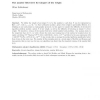Free Online Productivity Tools
i2Speak
i2Symbol
i2OCR
iTex2Img
iWeb2Print
iWeb2Shot
i2Type
iPdf2Split
iPdf2Merge
i2Bopomofo
i2Arabic
i2Style
i2Image
i2PDF
iLatex2Rtf
Sci2ools
128
click to vote
MOC
2010
2010
The number field sieve for integers of low weight
We define the weight of an integer N to be the smallest w such that N can be represented as w i=1 i2ci , with 1,..., w{1,-1}. Since arithmetic modulo a prime of low weight is particularly efficient, it is tempting to use such primes in cryptographic protocols. In this paper we consider the difficulty of the discrete logarithm problem modulo a prime N of low weight, as well as the difficulty of factoring an integer N of low weight. We describe a version of the number field sieve which handles both problems. Our analysis leads to the conjecture that, for N with w fixed, the worst-case running time of the method is bounded above by exp((c+o(1))(log N)1/3 (log log N)2/3 ) with c<((32/9)(2w-3)/(w-1))1/3 and below by the same expression with c=(32/9)1/3 (( 2w-2 2+1)/(w-1))2/3 . It also reveals that on average the method performs significantly better than it does in the worst case. We consider all the examples given in a recent paper of Koblitz and Menezes and demonstrate that in every c...
Related Content
| Added | 20 May 2011 |
| Updated | 20 May 2011 |
| Type | Journal |
| Year | 2010 |
| Where | MOC |
| Authors | Oliver Schirokauer |
Comments (0)

